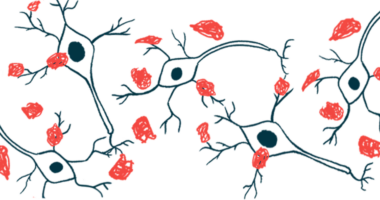Oral Enzyme Suppressor ASN90 Shows Promise in Mouse Model

Asceneuron’s experimental oral therapy ASN90 was found to significantly reduce the levels of toxic clumps of the alpha-synuclein protein — a hallmark of Parkinson’s disease — and improve motor function in a mouse model of the disease.
The molecule — a suppressor of O–GlcNAcase (OGA), an enzyme involved in regulating protein activity — also was found to reduce toxic tau protein, which accumulates in Parkinson’s and other neurodegenerative disorders, such as Alzheimer’s disease and progressive supranuclear palsy (PSP).
Since toxic clumps of alpha-synuclein and tau “frequently co-exist in neurodegenerative diseases, OGA inhibitors [suppressors] represent unique, multimodal [therapy] candidates for multiple indications,” Dirk Beher, PhD, CEO, co-founder of Asceneuron and the study’s senior author, said in a press release.
“These findings provide a strong rationale for the development of OGA inhibitors as disease-modifying agents in both [tau- and alpha-synuclein-related diseases] such as Alzheimer’s, PSP, and Parkinson’s disease,” Beher added.
The study, “O-GlcNAcase Inhibitor ASN90 is a Multimodal Drug Candidate for Tau and α-Synuclein Proteinopathies,” was published in the journal ACS Chemical Neuroscience.
Several neurodegenerative diseases are associated with the abnormal, toxic accumulation of protein clumps in the brain and spinal cord. In Parkinson’s, most of these toxic clumps are made of alpha-synuclein, but others consist of tau — a protein that forms toxic aggregates in Alzheimer’s and PSP.
O-GlcNAcylation is both a nutrient- and stress-responsive chemical modification that consists of the addition of a small sugar molecule to proteins to regulate their properties and function inside cells.
This chemical modification appears to be essential for the brain’s healthy function. Research shows O-GlcNAcylation is reduced in the aged brain, epilepsy, and Alzheimer’s. It has been shown to suppress the aggregation and toxicity of alpha-synuclein and tau.
As such, blocking OGA — the enzyme responsible for removing O-GlcNAcylation — is increasingly viewed as a potential approach to prevent further damage in neurodegenerative diseases associated with a buildup of toxic protein clumps.
Asceneuron’s ASN90 (formerly known as ASN120290 and ASN561) is a new and specific suppressor of the OGA enzyme, with greater potency and a better pharmacological profile relative to other OGA inhibitors.
Now, in animal studies, ASN90, given orally, was shown to strongly bind to the OGA enzyme in both the blood and brain of healthy rats. The molecule increased — “robustly,” according to the scientists — the O-GlcNAcylation of brain proteins, including alpha-synuclein and tau.
Notably, in an alpha-synuclein-based mouse model of Parkinson’s, nearly six months of daily treatment with ASN90 safely and significantly increased the levels of O-GlcNAcylated alpha-synuclein. Treatment with the enzyme suppressor also reduced the levels of a toxic form of the protein.
Moreover, treated mice also showed significantly slower progression of motor impairment from at least three months onward, and reduced astrogliosis. Astrogliosis comprises an increase in neuron-supporting cells in response to neuronal damage and has been associated with damaging effects in Parkinson’s.
In addition, the therapy significantly increased the levels of O-GlcNAcylated tau and lowered toxic tau forms in a mouse model of tau-related disease, while improving the animals’ motor and lung function, as well as their survival.
These findings “provide robust justification for both acute and chronic effects of ASN90 on the symptoms, pathology [disease-associated mechanisms], and disease progression in both tau and [alpha-synuclein] models,” the researchers wrote.
They also “highlight therapeutic potential for the use of OGA [suppressors] such as the clinical stage molecule ASN90 for the treatment of a wide range of common and rare neurodegenerative diseases,” the scientists wrote.
Of note, ASN90 was previously shown to be generally safe and well-tolerated in healthy young and elderly volunteers within a Phase 1 clinical trial.
Asceneuron plans to launch clinical trials to test ASN90 in people with PSP. The company also intends to test ASN51, its latest once-a-day OGA blocker, in those with Alzheimer’s.






